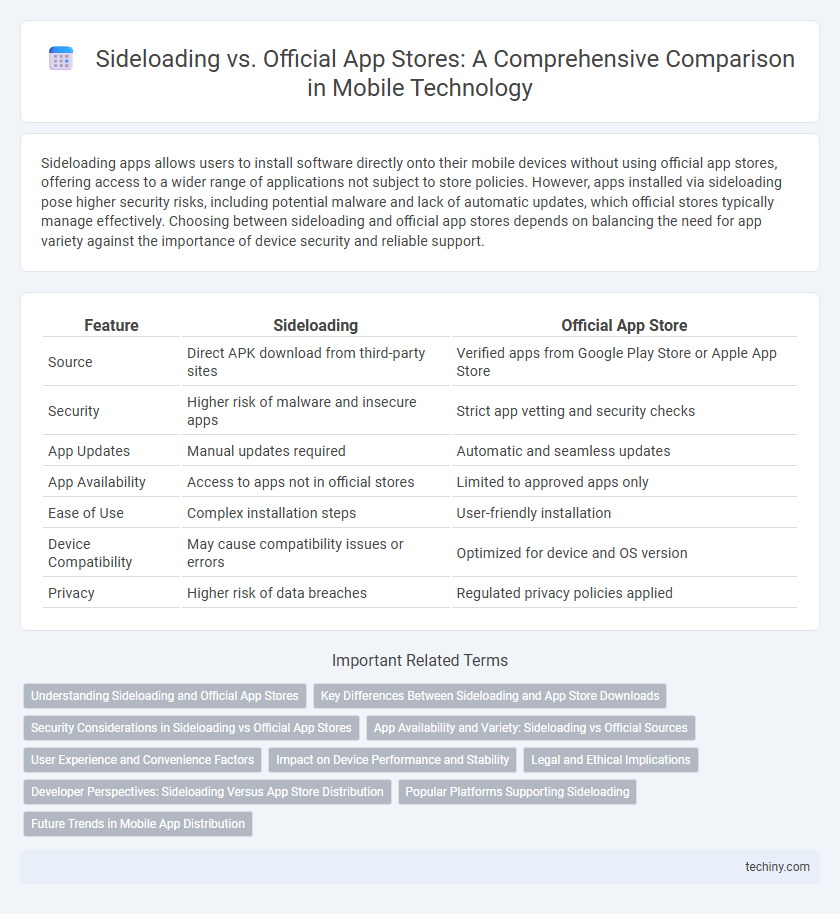Sideloading apps allows users to install software directly onto their mobile devices without using official app stores, offering access to a wider range of applications not subject to store policies. However, apps installed via sideloading pose higher security risks, including potential malware and lack of automatic updates, which official stores typically manage effectively. Choosing between sideloading and official app stores depends on balancing the need for app variety against the importance of device security and reliable support.
Table of Comparison
| Feature | Sideloading | Official App Store |
|---|---|---|
| Source | Direct APK download from third-party sites | Verified apps from Google Play Store or Apple App Store |
| Security | Higher risk of malware and insecure apps | Strict app vetting and security checks |
| App Updates | Manual updates required | Automatic and seamless updates |
| App Availability | Access to apps not in official stores | Limited to approved apps only |
| Ease of Use | Complex installation steps | User-friendly installation |
| Device Compatibility | May cause compatibility issues or errors | Optimized for device and OS version |
| Privacy | Higher risk of data breaches | Regulated privacy policies applied |
Understanding Sideloading and Official App Stores
Sideloading involves installing apps directly onto a mobile device from sources outside official app stores such as Google Play or the Apple App Store, bypassing the platform's security checks. Official app stores enforce strict app review processes to safeguard user data, ensure app quality, and prevent malware distribution. While sideloading offers greater app availability and customization, it carries higher security risks and may void device warranties.
Key Differences Between Sideloading and App Store Downloads
Sideloading involves installing mobile applications directly from third-party sources outside official app stores, bypassing standard security checks and increasing exposure to malware risks. Official app stores like Google Play or Apple App Store provide curated, vetted apps with regular updates, ensuring greater app security, reliability, and better user experience through automated update mechanisms. Users choosing sideloading gain access to apps unavailable in their region or customized versions but sacrifice the safety and automatic update advantages inherent to official app store downloads.
Security Considerations in Sideloading vs Official App Stores
Sideloading apps bypasses official app store security protocols, increasing the risk of malware, data breaches, and unauthorized access to sensitive information. Official app stores implement rigorous app vetting, continuous monitoring, and automatic updates to mitigate security vulnerabilities and protect user privacy. Users opting for sideloading should exercise caution by verifying app sources, employing reliable antivirus software, and regularly updating their device security settings.
App Availability and Variety: Sideloading vs Official Sources
Sideloading offers access to a broader range of apps, including those not available on official app stores due to regional restrictions or policy exclusions. Official app stores prioritize security and quality control, resulting in a curated selection of apps that ensures user safety but may limit availability. The balance between app variety and trustworthiness is a critical consideration for users choosing between sideloading and official sources.
User Experience and Convenience Factors
Sideloading apps offers users flexibility to access apps unavailable in official app stores, but it often requires manual updates and poses security risks that can degrade the user experience. Official app stores provide streamlined app installation, automatic updates, and vetted security protocols, enhancing convenience and reliability for most users. The trade-off between sideloading and official sources hinges on balancing app availability and customization against ease of use and safety.
Impact on Device Performance and Stability
Sideloading apps can introduce unverified software that may cause system instability and degrade device performance due to potential malware or poorly optimized code. Official app stores enforce strict security and quality standards, ensuring apps run smoothly and minimize risks of crashes or battery drain. Choosing apps from official sources generally maintains optimal device stability and performance over time.
Legal and Ethical Implications
Sideloading mobile apps bypasses official app stores, raising significant legal risks including potential violations of copyright laws and app distribution agreements. Ethical concerns involve increased exposure to malware and lack of user data protection, undermining both developer rights and consumer security. Official app stores enforce rigorous compliance with privacy standards and intellectual property policies, providing a safer ecosystem for both developers and users.
Developer Perspectives: Sideloading Versus App Store Distribution
Developers choosing between sideloading and official app store distribution must weigh control against reach; sideloading offers unrestricted app deployment and faster updates but faces limited user trust and visibility. Official app stores provide a secure, widely accessible platform backed by stringent review processes that enhance app credibility and user confidence. Balancing flexibility with compliance, developers must consider potential revenue models, update frequencies, and target audience trust levels when selecting their distribution method.
Popular Platforms Supporting Sideloading
Popular platforms supporting sideloading include Android, Amazon Fire OS, and to a lesser extent, Windows Mobile. Android's open ecosystem allows apps to be installed directly from APK files, enhancing flexibility beyond the Google Play Store. Amazon Fire OS users can sideload apps through APKs, bypassing the official Amazon Appstore for access to a broader range of applications.
Future Trends in Mobile App Distribution
Future trends in mobile app distribution emphasize increased flexibility, with sideloading enabling direct app installation outside official app stores, promoting innovation and user choice. Enhanced security protocols and blockchain-based verification systems are being developed to mitigate risks associated with sideloading, ensuring safer app environments. Growth in decentralized app marketplaces and progressive web apps (PWAs) reflects a shift towards more open and accessible distribution models beyond traditional app stores.
Sideloading vs Official App Store Infographic

 techiny.com
techiny.com